Routine vet care includes urinalysis, fecal and full GI panel, bloodwork, and antibody titer tests.
You should speak with your cat’s doctor about how frequently to do these tests and how to interpret them.
These are tests I do with Jericho to stay on top of his health and preventive care.
Preventive care is the best care!
These tests include urinalysis, fecal, full GI panel, CBC, antibody titer, and DNA.
Disclaimer: I earn a commission through affiliate links below. No additional cost to you.
Also, nothing I say is medical advice. All photos are of my cats.
Note: Please speak with your cat’s doctor about what’s appropriate for your cat.
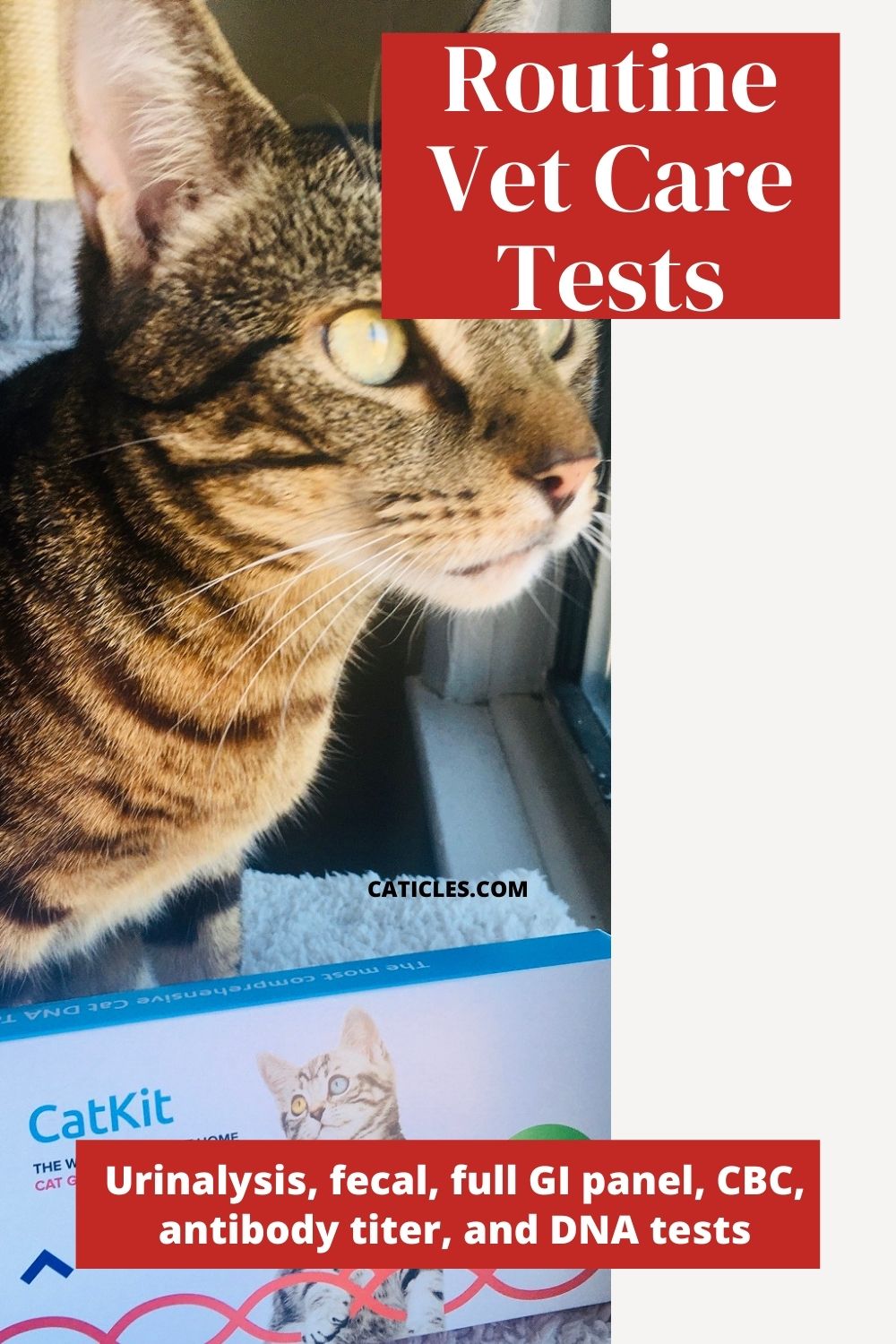
Collect urinalysis and fecal samples at home
Ask your cat’s doctor to mail the necessary supplies to you.
You should get from your cat’s doctor:
- Urine sample tube
- Sterile syringe
- Fecal sample container
- Bubble envelope for the samples
- Biohazard pack with an order to the lab
- Prepaid specimen parcel package
Collect and mail the samples straight to the lab.
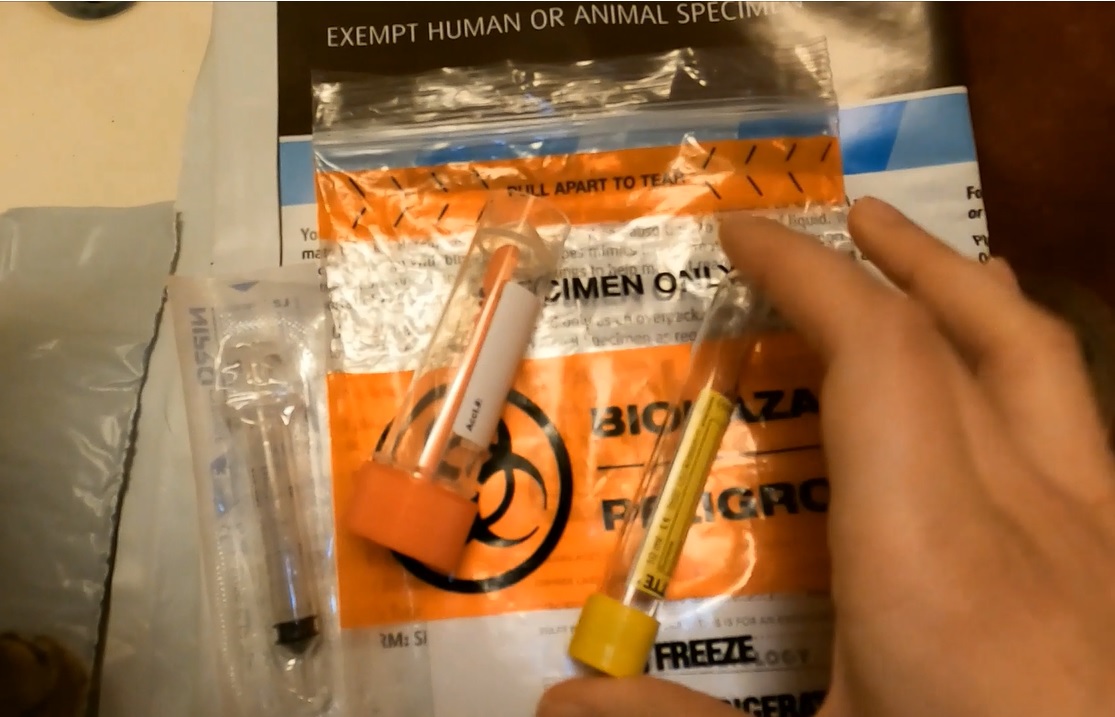
You can also use urine test strips at home (buy on Amazon US, CA, UK).
Use urine test strips to monitor between urinalysis labs. Do not rely solely on urine test strips.
Urinalysis indicates:
- Kidney function
- Urinary tract health
- Risk for health issues
The cost depends on your area and the doctor. I paid Jericho’s vet $60 for the labs and $9 for shipping supplies.
Jericho’s pH is high, and he has crystals.
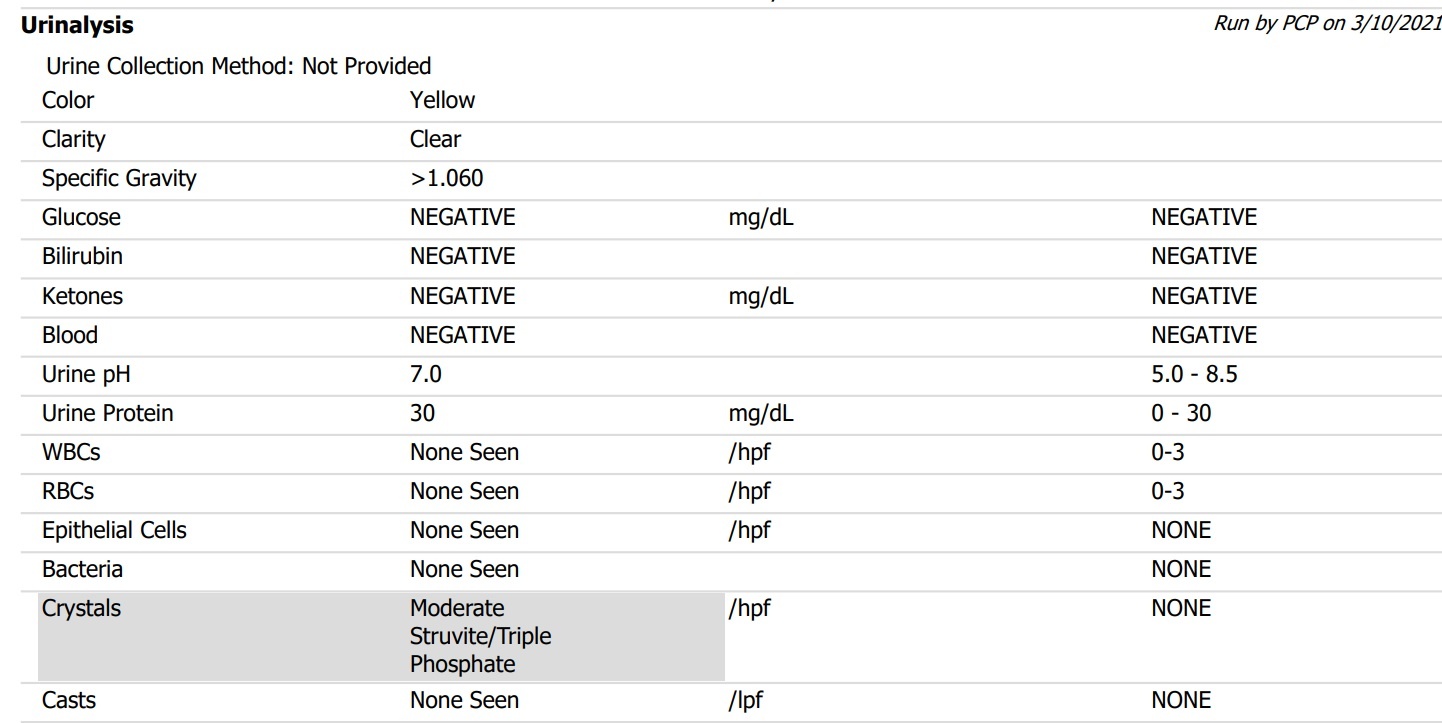
Check out urinary care for help with crystals etc.
General fecal exam tests for:
- Giardia
- Ova and parasite
Again, the price depends on your area and doctor. I spent $57.
Full GI panel tests for:
- Campylobacter (coli and jejuni)
- Cryptosporidium ssp. (Genus)
- Feline Enteric Coronavirus
- Feline Panleukopenia Virus
- Giardia
- Salmonella
- Toxoplasmosis
- Tritrichomonas foetus
The full GI panel cost me $190.
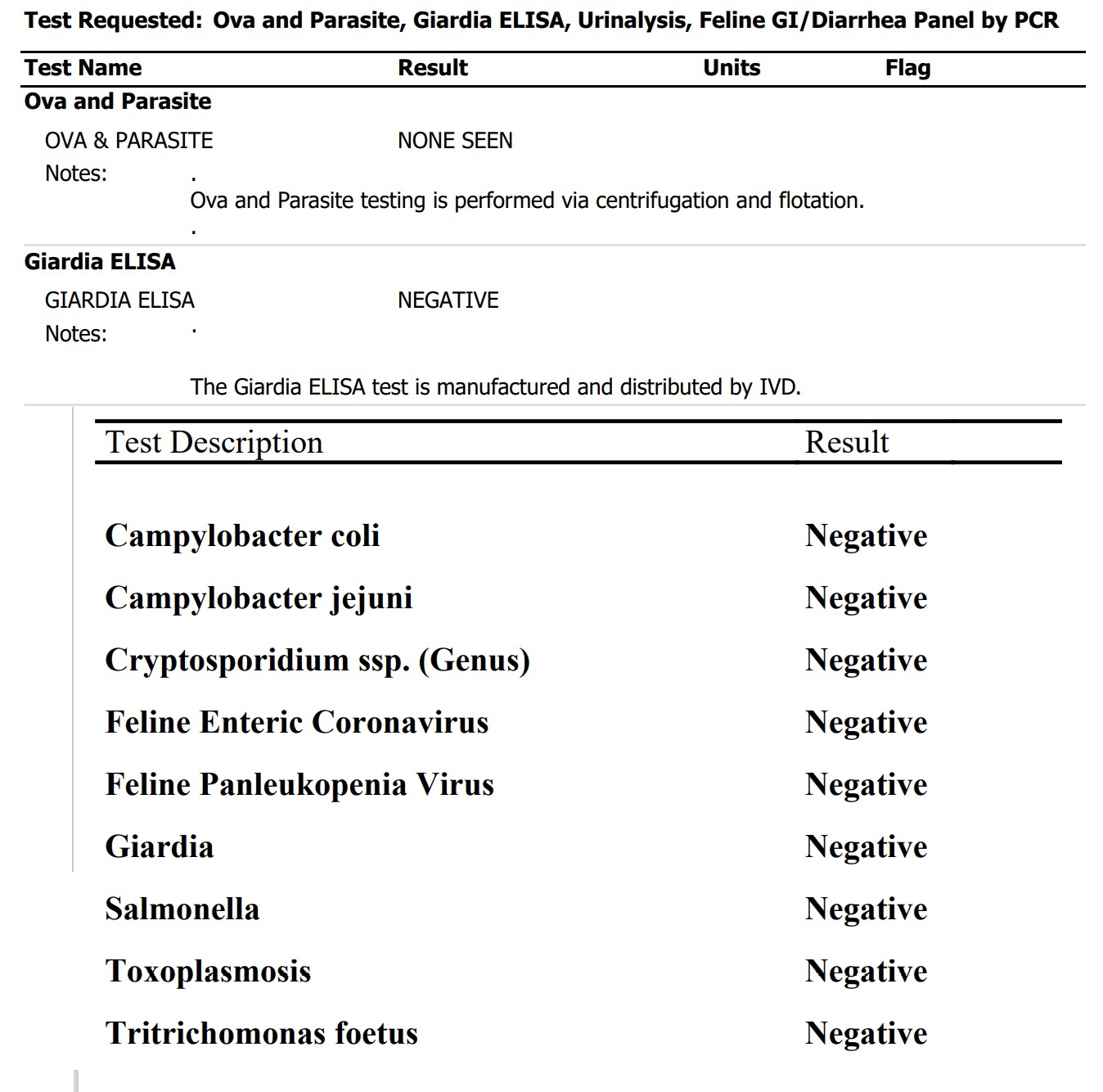
Jericho’s results for bacteria and parasites are all negative! And his diet is 100% raw!
Need help feeding your picky cat better? My switch your cat to raw course is for you!
Please speak with your cat’s doctor about what’s normal for your cat and how frequently to do these tests.
Typically urinalysis and fecal lab results are ready the next day. The full GI panel will take a few days.
Bloodwork and antibody titer tests from your vet
Your cat’s doctor will have to draw blood samples for the CBC and antibody titer tests.
Bloodwork indicates:
- 50+ different values
- Thyroid function
- High or low values indicate risk of health issues
- Immune function
You may read Vet Space to understand your cat’s labs. But please speak with your cat’s doctor about these values.
CBC cost me $250.
Jericho’s results (on a 100% raw diet) are below.
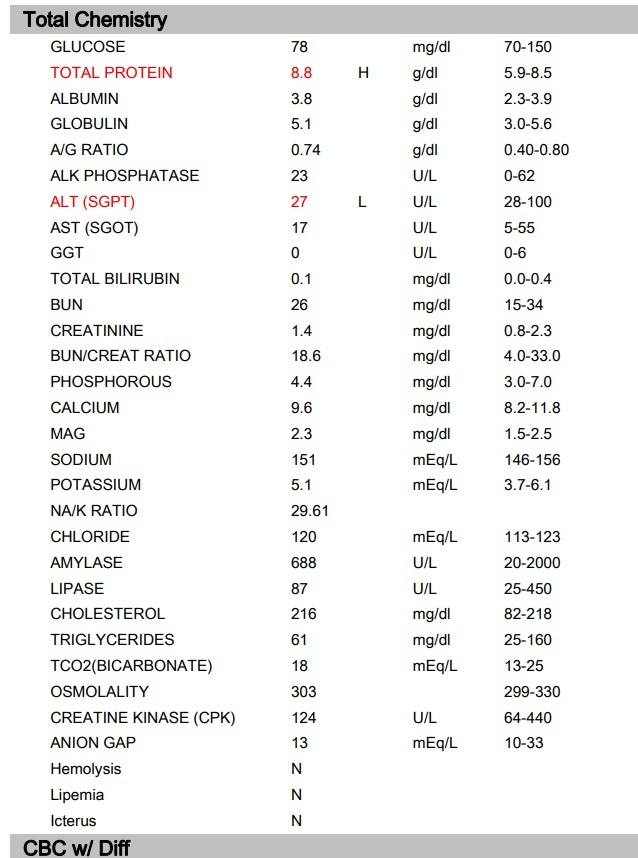
Surprisingly, Jericho’s BUN and creatinine are not elevated.
The consensus of raw feeders is that these values may be elevated.
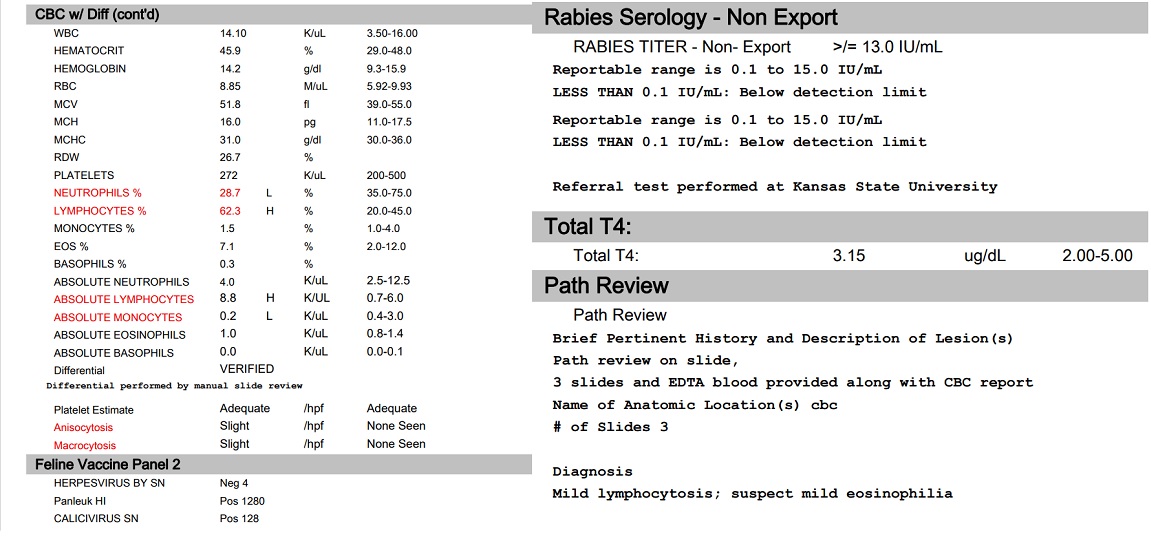
Jericho’s lymphocytes were high. So we looked at the pathology (cost $50).
The pathology review indicates chronic inflammation. It also states that lymphocytes might be elevated due to stress from drawing bloodwork.
Additionally, mild eosinophilia indicates hypersensitivity.
Antibody titer test:
- Tests for antibodies and immunity
- Do rabies and FVRCP
Each antibody titer test cost me $300.
Antibody titer tests are much better than overvaccinating.
Holistic vets say that vaccines may actually last the lifetime of the animal. And overvaccinating can do more harm than good.
Homeopathic Care for Cats and Dogs by Don Hamilton, DVM, has an entire chapter dedicated to vaccines.
Dr. Hamilton states:
“Even if vaccination is helpful, only initial vaccination is necessary.”
“Vaccines can and do cause disease, sometimes severe disease.”
“Titers can assess immunity, but once an individual shows a protective titer to a given illness, there is no need for further testing, as immunity is lifelong.”
You may think titers are expensive, but they are a one-time investment. You’ll avoid overvaccination which may lower the risk of a compromised immune system.
Worth the cost for me!
CBC results usually take a few days. The titer tests may take a week.
Final thoughts on routine vet care
Your cat’s doctor will let you know how frequently you should do these tests.
Typically, the minimum is once yearly. But some cats need more frequent labs.
We use these tests to see what’s going on with our cats on the inside.
And we use this information to come up with a preventive care wellness plan that works for our cat.
Want to keep track of your cat’s records? Grab my digital cat care binder or printable binders on Etsy!
